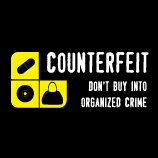 24 April 2014 - This week UNODC received an award for consumer awareness from the US Chamber of Commerce for its most recent campaign on counterfeit goods and the link that these products have to organized criminal networks.
24 April 2014 - This week UNODC received an award for consumer awareness from the US Chamber of Commerce for its most recent campaign on counterfeit goods and the link that these products have to organized criminal networks.
Launched in January 2014, the campaign, 'Counterfeit: Don't buy into organized crime', highlights the significant issues raised by the $250 billion a year illicit trafficking of counterfeit goods. The campaign informs the public that buying such products not only funds organized criminal groups, but also puts their health and safety at risk while at the same time contributing to other ethical and environmental concerns.
Since its launch, the campaign's Public Service Announcement has been aired by a large number of broadcasters around the world, including Bloomberg, CNBC, CNN, National Geographic as well as many national and regional broadcasters, and has so far been aired over 10,000 times. Entitled 'Look Behind', the PSA highlights the often disregarded, behind-the-scenes factors attached to counterfeiting and urges consumers to consider the serious repercussions of this illicit trade.
The campaign also showcases that as a crime which touches virtually everyone in one way or another, counterfeit goods pose a serious risk to consumer health and safety. With no legal regulation and very little recourse, consumers are at risk from unsafe and ineffective products and faulty counterfeit goods can lead to injury and, in some cases, death. Tyres, brake pads and airbags, aeroplane parts, electrical consumer goods, baby formula and children's toys are just some of the many different items which have been counterfeited.
Fraudulent medicines also present a serious health risk to consumers while criminal activity in this area is big business: the sale of fraudulent medicines from East Asia and the Pacific to South-East Asia and Africa alone amounts to some $5 billion per year. At the very least, fraudulent medicines have been found to contain no active ingredients, while at their worst they can contain unknown and potentially harmful chemicals.
A wide range of ethical issues can also be overlooked by consumers when considering the impact of counterfeiting. Labour exploitation with low paid workers facing safety and security concerns with little or no benefits and unregulated conditions is one aspect of producing counterfeit goods.
Consumers should also be aware that counterfeiting poses a significant environmental challenge: with no regulations in place, there is a real chance that harmful toxic dyes, chemicals, and unknown components used in counterfeit electrical goods are not disposed of properly, leading to serious environmental pollution.
Public Service Announcement - 'Look Behind'
Campaign website - 'Counterfeit: Don't buy into organized crime'